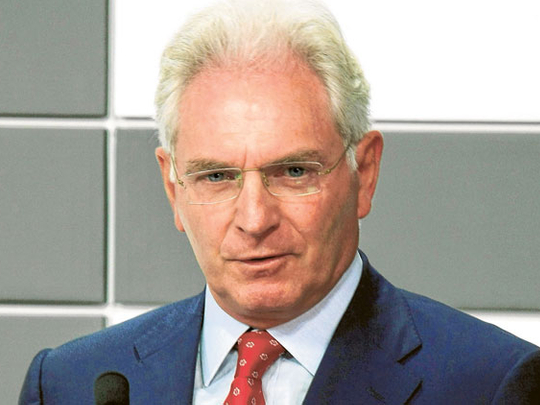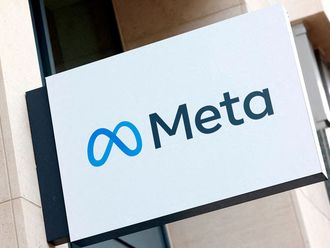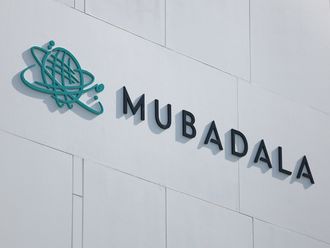
Corporate governance has been a much discussed topic in the country and region for almost a decade now. While countries in the Mena region have adopted some of the best codes, the general view is that the implementation remains much to be desired. As the annual conference of Hawkamah-OECD (Organisation for Economic Co-operation and Development), starting tomorrow, takes stock of the regional corporate governance developments - what has worked and what has not - Dr Nasser Saidi, chief economist and executive of the Hawkamah-Institute for Corporate Governance at the Dubai International Financial Centre (DIFC), said while the focus has been on listed companies for obvious reasons, the need is to expand disclosure and transparency reforms to family and state owned enterprises, as well as sovereign wealth funds. The burden of implementing should not only be on the regulators, but on the region’s global investors too, he says.
Gulf News: We have been hearing about corporate governance and the need to take it seriously for several years now. I would argue that while corporate governance codes, some of them robust, have been introduced in different countries, mplementation/enforcement was lagging behind. Would you say this is a fair assessment?
Dr Nasser Saidi: It is fair to say that implementation has been patchy, but one should also recognise that there have been substantial improvements in corporate governance, albeit from a low base, in just a few short years in the region. We should give credit to the regulators in the region for issuing codes for publicly listed companies and some regulators have taken additional steps. Last year, both the Saudi and Omani Capital Market Authorities set up corporate governance units to ensure proper implementation and compliance with their governance codes.
We need to build on this momentum. This is not a time for complacency. In many ways, the issuance of the corporate governance has been the easy part - the next challenge for the region’s regulators is how to support effective implementation of corporate governance in listed companies, especially in the areas of transparency and disclosure, board practices and risk management. The danger here, as is the case elsewhere in the world, is that corporate governance becomes a box-ticking exercise, where the principles and values of good corporate governance are not internalised by the companies and their boards.
Currently much of the burden for ensuring better implementation of corporate governance falls on the regulators. Hawkamah believes that regional investors, particularly the sovereign wealth funds, private equity, and banks as lenders should do more to drive the corporate governance reform within the companies they invest in and lend to.
But the more important issue for the region is to extend the corporate governance reform beyond the realm of listed companies, particularly to cover the state-owned enterprises, non-listed banks, and family-owned enterprises.
Gulf News: If you were to do an evaluation of the corporate governance reforms that have taken place in the last decade in the region on these specific points such as the split between annual report and web reporting; role of the board and management; importance of the independent directors, what would be your conclusions?
Dr Saidi: Although we have witnessed significant improvements in the quality of annual reports over the past two years and an increasing number of companies are now utilising their websites to communicate with their stakeholders, the region is still tackling with major transparency and disclosure issues.
It is often difficult to grasp from a company’s reporting how the company is being governed. Although the names of the largest shareholders are usually disclosed, the voting rights and other rights attached to each class of shares are not often spelled out.
Similarly, although the names of board members are usually disclosed, there may not be any information about the role of the board, what types of decisions are reserved for the board, how often it meets or indeed how the board members are nominated.
There also seem to be some variance on how board “independence” is defined in practice. While “independent” directors are usually independent from the management of the company, many times these directors have significant connections either to other board members or to significant shareholders.
Boards need to be encouraged to provide more meaningful statements of their activities, not as a compliance activity, but to demonstrate their commitment to corporate governance and also to demonstrate their awareness of risks and their skill in managing them.
The burden to implement the corporate governance code falls on the regulator of each country as far as listed companies go — how would you compare the different countries in the region?
Gulf News: How have the different countries fared? What about the UAE?
Dr Saidi: As Hawkamah studies have indicated, Oman has generally been ahead of the curve in terms of corporate governance. They were the first country in the GCC to have issued a corporate governance code in 2002 and as a consequence, the average disclosure scores of Omani companies have been higher than those in other GCC countries, but this has started to change following the issuance of codes by the CGG members. For example, we are already witnessing better disclosure by listed companies in the UAE, Qatar and Bahrain, which all have issued codes in the last two years.
The CMA in Saudi Arabia, like their counterpart in Oman, has demonstrated their commitment to corporate governance by establishing corporate governance unit last year to ensure proper implementation and compliance with their governance codes.
In the UAE, after issuing the code, the Securities and Commodities Authority (SCA) has been working with companies mandated to follow the Ministerial Decree on corporate governance to produce their corporate governance reports and we are seeing significant improvements on this regard. Similarly, the Dubai Financial Services Authority has been a very active regulator having issued their guidelines and have been willing to pursue directors and companies not complying with the financial free zone’s corporate governance code.
But the focus of implementation should not solely be on enforcement, but on facilitation of better corporate governance practices by capacity building initiatives as one of the barriers to better governance, often cited by companies, is the lack of know-how and experts.
Gulf News: Is there a role for the region’s investors?
Dr Saidi: The burden of ensuring better implementation of corporate governance within listed companies should not solely rest on the shoulders of the regulators. Regional investors should play a key a role in this.
The fact that investors are not looking into corporate governance when making investments has the consequence that the benefits of good corporate governance have been typically seen by companies in terms of better strategic decision-making and regulatory compliance rather than being associated with better and cheaper access to credit and capital or improved valuation of companies.
In the UK and in South Africa, the regulators have issued corporate governance codes for investors – stewardship codes, which mandate them to incorporate corporate governance criteria in their investment and ownership policies. I call for the GCC countries, who are capital exporting countries and major global investors, to develop similar guidelines. We must change investment policies to become active - if not activist - share owners and not passive shareholders!
I also urge the regional companies to invest in companies such as those that are included in the Hawkamah-S&P Environmental, Social and Governance (ESG) Index. It ranks and tracks the transparency and disclosure of regional listed companies on ESG issues. The constituents of this Index are derived from 11 Arab equity markets. The purpose of this Index is to identify the Mena companies that go the extra mile in ESG reporting and policy implementation. The Hawkamah-S&P Index is a tool for international and regional investors who may not have the expertise in the Mena companies or in incorporating corporate governance in their investment processes.
Gulf News: When compared to some of the OECD or western countries the region’s stock exchange regulators have relatively less self regulatory powers - why is that so? Is that going to change anytime soon?
Dr Saidi: So far, most regional exchanges have played a limited role in terms of establishing and monitoring compliance with corporate governance requirements. There are significant differences in the scope of exchanges’ responsibilities in terms of setting listing requirements, accepting listings, applying sanctions and de-listing.
The primary functions that Mena exchanges perform to promote good corporate governance outcomes relate to the dissemination of information to the investing public and raising awareness around good corporate governance practices with investors and issuers.
The Muscat Declaration issued at last year’s Hawkamah’s annual conference mandates Hawkamah and the OECD to work with regional stock exchanges on further improving corporate governance of listed companies. The OECD has already worked with stock exchanges in its own member countries in the context of a similar project which aimed at arriving at a better understanding of the role of stock exchanges in creating and monitoring corporate governance standards. A final report of this Task Force is expected to be presented at the Hawkamah’s Annual Conference in 2012.
Gulf News: Until now we were largely talking about public listed companies. But a vast majority of companies in the private sector are still unlisted large family controlled businesses. What could be done to make them more transparent and adhere to a code more rigorously?
Dr Saidi: The focus of corporate governance improvements should not solely be on the listed markets. Given the important financial intermediation role of banks in an economy, corporate governance is of particularly great relevance to individual banks, the banking sector and economy as a whole. This merits targeted supervisory guidance.
But in a region, which is dominated by non-listed, family-owned enterprises and/or small and medium sized companies that typically look to banks to finance their expansion through loans, it is the banks that are in the prime seat to drive governance reform. Indeed bank intermediated finance represents some 60 per cent of the overall financial structure in Mena, while debt finance is underdeveloped at 10 per cent of the total. Hawkamah in the partnership with the OECD and the Union of Arab Banks have issued a Policy Brief on improving the corporate governance of banks in Mena. Although the Policy Brief is primarily focused on addressing the governance challenges faced by the sector and the regulators/ central banks, one of its recommendations is for banks to incorporate corporate governance criteria into their lending criteria.
Corporate governance is equally important in the realm of State-Owned Enterprises (SOE). By improving the process of decision making and control by the state, good governance can improve performance and competitiveness of SOEs. In many instances, better performing SOEs can have positive fiscal implications, insofar as government budgets are all too often called to the rescue of large SOEs. We have seen this particularly happen during the current financial crisis. We urge that the mandate of State Audit Institutions across the Mena is widened to monitor and improve corporate governance practices of SOEs.
Gulf News: Given that the Arab Spring was to a large extent about lack of economic opportunities, going forward reform of both privates sector and government owned enterprises have to be carried out? Do the leaders of both sectors get it?
Dr Saidi: Although it is difficult to predict the outcome of the current turmoil, the “Arab Spring” or the “Arab Firestorm”, it has highlighted some pressing demographic, political, governance and socioeconomic challenges, which, if properly addressed, should lead to further corporate governance reform.
The two themes that come out of the Arab firestorm are job-creation and employment and accountability, which directly relate to the need for private sector growth and reform of the state-owned enterprises.
Private companies and family-owned enterprises constitute the backbone of the corporate sector and account for a large fraction of employment. It is this sector that needs to grow if the region is to tackle the unemployment crisis and create jobs. Just for Egypt, Jordan, Lebanon, Morocco, Syria, Tunisia, some 18 million new jobs are required by 2020.
For the private sector to grow, a mechanism must be set up to facilitate the process through which companies could tap into the equity markets. The regional capital markets are tailored for large companies, whereas a stock exchange should be created to meet the needs and the ambitions of the private companies. A second-tier equity market for young and growth companies might become a key driver in the development of a liquid capital market, the diversification of economic activities and provide long-term capital for the growth of the dynamic entrepreneurial segment of the economies of the region. It would also facilitate the introduction of corporate governance into this important segment of the economy, and thereby become a key driver of corporate governance.
The public sector of many Arab countries has been at the heart of the unrest. The finger of blame has been pointed to government, to weak and poor governance and the implementation of inadequate policies serving special interest groups, personal interests of leaders, political clientelism and not servicing the public at large. It is not uncommon for underperforming SOEs to have undermined competition and weighed down on growth.
We need to level the playing field with the private sector, reinforce the SOE’s ownership function, try to delineate and avoid the mixing of political or social policy and business decisions, improve transparency, empower SOE boards and improve their accountability.
There should also be a clear separation of ownership from regulation, policy-making and other state-related functions of SOEs, including industrial policy. The separation of the ownership function ensures a level-playing field with the private sector and provides for a healthy environment for competition. The imperative for this become more pronounced following the Arab Spring, not only in countries such as Tunisia and Egypt, but across the Mena.
To facilitate this process, Hawkamah is currently working with the OECD to publish a policy brief which sets out key recommendations on improving corporate governance practices within SOEs.
Gulf News: When it comes to GREs (government-related entities)in the Gulf, ratings agencies have been critical of the level of disclosures, which could be argued to be minimal and at times confusing. In fact there were questions marks on whether the government would support or not some government affiliated entities. That led to downgrading of some of the GREs. What suggestions do you have when it comes to enforcement of better disclosure standards by the GREs?
Dr Saidi: Each ownership entity should use aggregate reporting to present an accurate picture of its SOE portfolio, and, the coordinating body or principal entity should report on the state sector as a whole.
The International Public Sector Accounting Standards Board’s IPSAS 22 lays down the disclosure of Financial Information about the General Government Sector which emphasises that the disclosure of appropriate information about the general government sector can enhance the transparency of financial reports, and provide for a better understanding of the relationship between the market and non-market activities of the government and between financial statements and statistical bases of financial reporting.
This disclosure should be subject to appropriate governmental audit and oversight. For listed GREs an independent external audit should also be carried out in addition to the government audit.
Better disclosure and based on international standards for disclosures along with a proper audit would encourage GREs to improve their disclosure standards and hence attract better rating.
Gulf News: What could the private sector and the state owned enterprises do themselves and/or the regulators do to improve their governance?
Dr Saidi: The SOEs should lead by example and inculcate good CG frameworks and practices within their organisation in accordance with international best practices laid out for frameworks need to be tailored to the specificities of the region and the sector in which the SOE operates.
Also based on the CG work that Hawkamah has carried out in the region, we feel that CG regulations, if made mandatory, gets more attention as the practice of voluntary compliance with CG frameworks is less prevalent in the region.
As far as the regulators are concerned, the regulatory bodies should be independent in legal structure since they are the standard setting bodies and policy work should not be subject to undue influence by the government by virtue of it being a part of the governmental body. In essence, the ownership, policy making and regulation function should be separated.
Gulf News: What is the importance of this conference?
Dr Saidi: The Hawkamah-OECD conference is an annual gathering of corporate governance experts. The idea behind the annual conferences is to take stock of regional corporate governance developments, identify the best practices, what has worked, what has not, and map out the next phases of corporate governance development. Each of our conferences builds on the previous year’s conference - the key is to provide continuity to the corporate governance reform in the region.
Gulf News: Finally, if you were appointed a corporate governance czar of the GCC what else would you do?
Dr Saidi: A good first step is for a unified code to be developed for all listed companies in the GCC. Most of the capital market authorities in the GCC countries’ have issued their own codes, it would be a worthwhile initiative to start aligning all of these codes into a unified one. Additionally, given the predominance of state-owned enterprises in our region, it would be a positive step if corporate governance guidelines for SOEs are issued as well.
Beyond codes, there is a need to work with both regulators and companies to strengthen the compliance of these codes, and going beyond mere compliance. Regulators need to develop stronger compliance units focusing on reviewing the corporate governance disclosures submitted by companies.
In the same token, companies need to realise that good corporate governance practices is not just a compliance exercise; it is also about ensuring effective board dynamics, robust control environment, productive relationship between board and management, respecting shareholder and stakeholder rights, and greater transparency and meaningful disclosure. Acknowledging that at the very heart of corporate governance is a good board, as a corporate governance czar I would also mandate that all directors serving regional board rooms are accredited. This will ensure that directors have a common understanding of good corporate governance practices.












